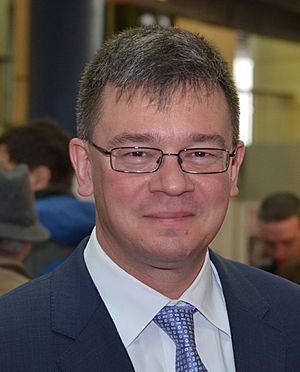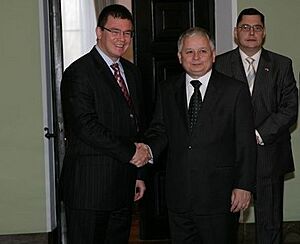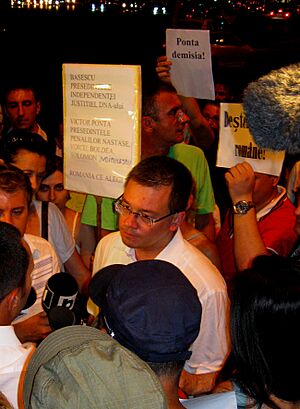Mihai Răzvan Ungureanu facts for kids
Quick facts for kids
Mihai-Răzvan Ungureanu
|
|
|---|---|

Ungureanu in 2013
|
|
| Prime Minister of Romania | |
| In office 9 February 2012 – 7 May 2012 |
|
| President | Traian Băsescu |
| Deputy | Béla Markó |
| Preceded by | Cătălin Predoiu (Acting) Emil Boc |
| Succeeded by | Victor Ponta |
| Director of the Foreign Intelligence Service | |
| In office 5 December 2007 – 9 February 2012 |
|
| Preceded by | Silviu Predoiu (Acting) |
| Succeeded by | Teodor Meleșcanu |
| In office 30 June 2015 – 26 September 2016 |
|
| Preceded by | Silviu Predoiu (Acting) |
| Succeeded by | Silviu Predoiu (Acting) |
| Minister of Foreign Affairs | |
| In office 28 December 2004 – 12 March 2007 |
|
| Prime Minister | Călin Popescu-Tăriceanu |
| Preceded by | Mircea Geoană |
| Succeeded by | Călin Popescu-Tăriceanu (Acting) |
| Member of the Senate of Romania | |
| In office 19 December 2012 – 1 July 2015 |
|
| President of the Civic Force | |
| In office 7 September 2012 – 16 July 2014 |
|
| Preceded by | Adrian Iurașcu |
| Succeeded by | Vasile Blaga (party merged with the Democratic Liberal Party) |
| Personal details | |
| Born | 22 September 1968 Iași, Romania |
| Political party | None |
| Other political affiliations |
National Liberal Party (2004–2007) Civic Force (2012–2014) Democratic Liberal Party (2014) National Liberal Party (2014–2015) |
| Children | Ștefan Luca Ungureanu |
| Alma mater | Alexandru Ioan Cuza University, Iași St Cross College, Oxford |
| Occupation | Professor, diplomat, politician |
| Profession | Historian |
Mihai Răzvan Ungureanu (born September 22, 1968) is a Romanian historian and politician. He served as the Prime Minister of Romania in 2012. Before that, he was the foreign minister of Romania from 2004 to 2007. Later in 2007, he became the Director of the Foreign Intelligence Service.
After the government led by Emil Boc resigned, Ungureanu was chosen to be prime minister. He served until April 2012, when his government was removed by a vote in Parliament. In 2015, he was confirmed for a second time as Director of the Foreign Intelligence Service. He resigned from this role in September 2016 due to health reasons.
Contents
Education and Early Life
Mihai Răzvan Ungureanu went to Costache Negruzzi High School in Iași. He studied Maths and Physics there and graduated at the top of his class in 1987. He then studied History and Philosophy at the Alexandru Ioan Cuza University, finishing in 1992.
From 1985 to 1989, he was involved with the Union of Communist Youth. Between 1990 and 1992, he represented students in the university's senate. In 1993, he earned a master's degree from the University of Oxford. In 2004, he received his PhD from Alexandru Ioan Cuza University. His PhD work focused on how people changed and fit into Romanian society long ago.
Career in Public Service
Ungureanu started his career as an assistant professor at Alexandru Ioan Cuza University. In 1998, he joined the diplomatic service. He worked as a State Secretary in the Ministry of Foreign Affairs from 1998 to 2000. From 2000 to 2004, he was a representative for the Stability Pact for South Eastern Europe.
Foreign Minister Role

Ungureanu was a member of the National Liberal Party (PNL). He became the foreign minister after Traian Băsescu won the presidential election. In February 2007, Prime Minister Călin Popescu-Tăriceanu asked Ungureanu to resign. This was because Ungureanu had not told the government about two Romanian workers held by forces in Iraq. Ungureanu confirmed his resignation on February 4, 2007. President Traian Băsescu officially removed him from his position on March 12.
Leading the Foreign Intelligence Service
On November 27, 2007, President Băsescu nominated Ungureanu to lead the Foreign Intelligence Service (SIE). This important role had been empty for some time. On December 5, a joint meeting of Parliament confirmed Ungureanu in his new position. Most of the Members of Parliament voted in favor of him.
Becoming Prime Minister
On February 6, 2012, President Traian Băsescu asked Ungureanu to form a new government. The Romanian Parliament approved his government on February 9, 2012. As prime minister, Ungureanu promised to continue reforms. He also aimed to make Romania's economy and politics stable during a difficult time.
Some people thought Ungureanu might become a candidate for president in the future. However, after about two and a half months, his government faced a vote of no-confidence. The opposition leader, Victor Ponta, replaced him as prime minister on May 7, 2012.
After the Prime Minister Role
After his time as prime minister, Ungureanu remained active in politics. In July 2012, he helped start a non-governmental organization called the Center-Right Civic Initiative (ICCD). He later joined the Civic Force party on August 31.
Ungureanu was elected as the leader of the Civic Force party in September 2012. He worked to expand the party across the country. He also met with European political leaders to help his party join the European People's Party (EPP). In the 2012 elections, Ungureanu won a seat in the Senate.
Personal Life
Mihai Răzvan Ungureanu is married and has one son. He is very good at several languages. He speaks English, French, and German. He can also read Hungarian.
See also
- Ungureanu cabinet
 | Anna J. Cooper |
 | Mary McLeod Bethune |
 | Lillie Mae Bradford |


